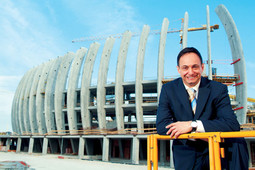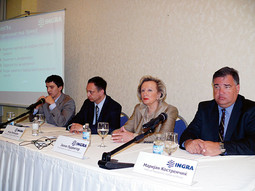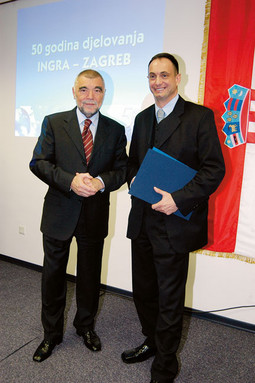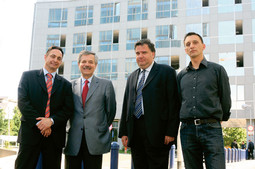Published in Nacional number 653, 2008-05-19
Ingra's new offensive
We're setting up a concern for Africa and Russia
Igor Oppenheim, the top man at Ingra, Croatia's leading civil engineering company, which recently took over ownership of the Macedonian company Mavrovo, reveals its project to pool some ten companies into a construction concern targeted to foreign markets
 Oppenheim at the construction site of the handball Arena being built at Zagreb's Laniste by Ingra and Trigranit The attention of the Croatian business sector was focused last week on the final confirmation of the news that has been circulating among construction circles for months now: Zagreb's Ingra has taken over the Macedonian construction company Mavrovo. With the acquisition of an 80 percent stake in the company Ingra has demonstrated that besides on the Croatian market, where it has been active over the past few years more than ever before, it has serious plans to expand its operations in the Balkans. In this interview for Nacional, President of the Board Igor Oppenheim explains why his company decided to buy the Macedonian firm, and also announced a project to pool some ten Croatian construction companies that would appear in the future on foreign markets.
Oppenheim at the construction site of the handball Arena being built at Zagreb's Laniste by Ingra and Trigranit The attention of the Croatian business sector was focused last week on the final confirmation of the news that has been circulating among construction circles for months now: Zagreb's Ingra has taken over the Macedonian construction company Mavrovo. With the acquisition of an 80 percent stake in the company Ingra has demonstrated that besides on the Croatian market, where it has been active over the past few years more than ever before, it has serious plans to expand its operations in the Balkans. In this interview for Nacional, President of the Board Igor Oppenheim explains why his company decided to buy the Macedonian firm, and also announced a project to pool some ten Croatian construction companies that would appear in the future on foreign markets.
NACIONAL: You finalized the takeover of the Macedonian company Mavrovo a few days ago. What does this move mean for Ingra?
- The public tender was closed on 29 April and we are now 79 percent owners of Mavrovo. With the move we have gained a synergy with what we lacked, and that is the labour and mechanisation necessary to carry out complex investment projects abroad, and in Croatia if ever needed, because construction capacities are often tied up here. For several years now we have faced the problem that we are unable to find many who are willing to go with us on major projects abroad. Mavrovo is a company that has been around for 60 years, is involved in both civil engineering and building construction, is currently completing a sports arena in Skopje, has constructed tunnels, roads, dams and other major projects. We have worked with the company in the past and they are not unknown to us, nor are we unknown to them, so that it will be an optimal combination: our engineers and the experts and labour force in Mavrovo. They are already present in parts of markets we are interested in, such as Russia, Bulgaria, Albania, and we are, of course, counting on them on some of our traditional markets such as Algeria. We have already put forward a joint bid for the construction of a dam in Algeria, and if some major infrastructure projects in Algeria go through – like a marina in the capital city or the Madagh tourist resort, which is to be completed in a few years, and is worth about 500 million euros – there too we are counting on Mavrovo. In the 1990s Mavrovo did a lot of jobs that they were not paid for by state-owned companies, and there are still open obligations towards the state, and we are hoping to work something out in that respect. There is nevertheless a healthy core to the business that can be revitalized with a certain dose of modernization and modern approaches, so that in the end we will have a strong labour and mechanisation entity able to execute even the most complex projects, and that will allow us greater flexibility than we currently have, where we have to a large extent been dependent on sub-contractors.
NACIONAL: After your acquisition of Mavrovo was announced some analysts said that you wanted to bolster your position in the region through Mavrovo, i.e. in the area of the former Yugoslavia, while others concluded that Russia was in the focus of your interest, where Mavrovo has been licensed to work for many years. What is in fact the truth?
- Both are true. We feel that it is good that Mavrovo is licensed to work in Russia, and the Russian market is in fact interesting to us. We have already been offered projects that we, unfortunately, could not undertake because of labour force reasons or the price at which they were to have been carried out. On the other hand the region is also of interest to us. In Bosnia & Herzegovina we were recently first in a tender to construct the Sarajevo beltway with accompanying viaducts worth 23 million euro. Besides that there are a few more interesting road construction projects, from corridor 5c to corridor 10 in Macedonia, and one should not forget Kosovo and Albania where there are also opportunities for various projects.
NACIONAL: For decades Ingra was better known abroad than in Croatia, something that has changed over the past ten years with a greater number of projects in Croatia. Where is Ingra today?  Igor Oppenheim, Jasna Ludviger and Marijan Kostrencic announced the Ingra takeover of the Mavrovo Company at a press conference held last week in Skopje - Ingra is nowadays active in Croatia for the most part, more than ever before. The Arena Zagreb is the largest and most significant project, and is also the most visible. Then there are residential buildings, from Zagreb's Ilica Street and Srebrenjak, to Dubrovnik, where construction has started on the Lapad commercial and residential complex. The Lapad hotel is being reconstructed, where we are co-owners along with the Atlantska plovidba Company, and which we see as the focal point for a future reception area of the new Dubrovnik marina, and accompanying facilities are to be built. We will continue with residential construction in and around Dubrovnik. This year we will launch construction of the Slano marina, the first of a foreseen 13 marinas. In the Croatian south we are involved in road construction, from Split towards Ploce. The current scope of road construction in Croatia is 485 million kuna, of which 185 have been realised, and the remainder is to be realised in this and the coming year. Outside of Croatia our presence is greatest in Algeria, in maritime projects and the construction and repair of harbours and in the renovation of hydromechanical and electronic equipment at the Ghrib Dam. We have tendered a bid for the construction of a medical centre in the city of Algiers and for a large tourist resort.
Igor Oppenheim, Jasna Ludviger and Marijan Kostrencic announced the Ingra takeover of the Mavrovo Company at a press conference held last week in Skopje - Ingra is nowadays active in Croatia for the most part, more than ever before. The Arena Zagreb is the largest and most significant project, and is also the most visible. Then there are residential buildings, from Zagreb's Ilica Street and Srebrenjak, to Dubrovnik, where construction has started on the Lapad commercial and residential complex. The Lapad hotel is being reconstructed, where we are co-owners along with the Atlantska plovidba Company, and which we see as the focal point for a future reception area of the new Dubrovnik marina, and accompanying facilities are to be built. We will continue with residential construction in and around Dubrovnik. This year we will launch construction of the Slano marina, the first of a foreseen 13 marinas. In the Croatian south we are involved in road construction, from Split towards Ploce. The current scope of road construction in Croatia is 485 million kuna, of which 185 have been realised, and the remainder is to be realised in this and the coming year. Outside of Croatia our presence is greatest in Algeria, in maritime projects and the construction and repair of harbours and in the renovation of hydromechanical and electronic equipment at the Ghrib Dam. We have tendered a bid for the construction of a medical centre in the city of Algiers and for a large tourist resort.
There is also the traditional Middle Eastern market, including still volatile Iraq, where, besides on the delivery of a cooling system for the Al-hamal thermoelectric power plant, we are working on the renovation of other energy facilities such as the Haditha hydroelectric power plant, where there is a lot to be reconstructed. We have started the reconstruction of these units in the conditions that are currently possible, without an intensive physical presence at the facility itself, as security issues remain unresolved. We are present in Germany with a detachment that is again at its zenith, and will this year have a turnover in excess of 60 million euro. 1,500 people work in shipbuilding, installation, even in construction, so that the German market has once again become quite active. The other markets are smaller, such as Libya, the Sudan, where we are working on smaller projects, but there are interesting perspectives. There is work, even in the Russian Federation, where construction is intensive. Moscow is unrecognisable today compared to previous decades. There is also Ukraine, which will be interesting because of the European football cup. Ingra, after all, built the first big hotel in Socija, the Dagomis, with a then impressive 2,000 beds, some 30 years ago, so that there is sure to be a lot of work involved in the renovation of existing and construction of new buildings for the 2014 Winter Olympics.
NACIONAL: A few years ago Ingra was offered the construction of 200 kilometres of roads in Algeria, but you were unable to find partners in Croatia for the project. There is work. But is the labour force sufficient?  President Mesic is making an effort to open the African and Middle Eastern markets to Croatian companies - It is. Both through Mavrovo, and through creating ties in Croatia we believe we can achieve more. I think that I can announce a serious link up of Croatian construction companies in the frame of Ingra, with a significant labour force able to satisfy the requirements of even the most complex licences and facilities, and that firm core can be a solid basis for the construction of the most complex projects, not only in Croatia, but also abroad. We believe that the time has come to make a step forward in a firming linking of construction companies that would presently, on there own, be hard put to it to undertake projects of the highest complexity. The core of this link up is made up of the Osijek Koteks, Hidroelektra, GP Dubrovnik, Palmir, Europlin and GP Zagorje companies, all in all a dozen interested companies that would form a kind of consortium, i.e. construction concern, with significant potential. In the construction of the Arena we have found partners able to carry out a complex structure, with lamella, each weighing between 180 and 250 tonnes, and that implies a construction technology that can be applied in other complex projects such as hydroelectric power plants – a modern approach rather than just a traditional one using steel and concrete. Because all traditional constructors like it best when they work with large quantities of steel and concrete, while modern technologies imply on-site construction, as is the case with the Arena, where there is a lot of work with cables and prestressing. In Croatia constructions are made only with reinforced concrete, while abroad building is also done with steel constructions, there is a lot of work done with glass, all those things that are yet to come to the Croatian construction industry. This is not easy to introduce in traditionally oriented milieus or companies that have been doing things the same way for 20 or 30 years. We would like to change some things here and hope we will succeed in doing so.
President Mesic is making an effort to open the African and Middle Eastern markets to Croatian companies - It is. Both through Mavrovo, and through creating ties in Croatia we believe we can achieve more. I think that I can announce a serious link up of Croatian construction companies in the frame of Ingra, with a significant labour force able to satisfy the requirements of even the most complex licences and facilities, and that firm core can be a solid basis for the construction of the most complex projects, not only in Croatia, but also abroad. We believe that the time has come to make a step forward in a firming linking of construction companies that would presently, on there own, be hard put to it to undertake projects of the highest complexity. The core of this link up is made up of the Osijek Koteks, Hidroelektra, GP Dubrovnik, Palmir, Europlin and GP Zagorje companies, all in all a dozen interested companies that would form a kind of consortium, i.e. construction concern, with significant potential. In the construction of the Arena we have found partners able to carry out a complex structure, with lamella, each weighing between 180 and 250 tonnes, and that implies a construction technology that can be applied in other complex projects such as hydroelectric power plants – a modern approach rather than just a traditional one using steel and concrete. Because all traditional constructors like it best when they work with large quantities of steel and concrete, while modern technologies imply on-site construction, as is the case with the Arena, where there is a lot of work with cables and prestressing. In Croatia constructions are made only with reinforced concrete, while abroad building is also done with steel constructions, there is a lot of work done with glass, all those things that are yet to come to the Croatian construction industry. This is not easy to introduce in traditionally oriented milieus or companies that have been doing things the same way for 20 or 30 years. We would like to change some things here and hope we will succeed in doing so.
NACIONAL: What happened with the idea of a cluster that would pool all of Croatia's large construction firms, who would appear jointly on foreign markets?
- The idea is still in the air, but not easily implemented, because the largest companies are often self-sufficient. Although everyone pays lip service to the idea of cooperation, when a concrete project or a concrete country is at issue it is very hard to encourage the largest companies to make a joint appearance, and some are hard to bring together. It would be ideal if some twenty or more Croatian firms could actually appear on the market in concert and each carry out a part of the work, but in the near future that will be hard to do without a clear division of stakes and without linking equity. Because each of the large companies looks first to its own interests, trying to do as much of the work on its own, and not in collaboration with others.
NACIONAL: For two-three years now Ingra has often surprised with its new projects in Croatia – from ports on the Adriatic seaboard, to biodiesel plants and wind turbine electric power plants. Some analysts see Ingra's diversification as dangerous, others a good.
 The Arena team - Igor Oppenheim with Christos Courtis, the designer of the handball arena in Zagreb, Marijan Kostrencic, the president of the Ingra supervisory board, and architect Alan Plestina - I always feel that it is a good thing, because from day one Ingra was not involved only in one branch, it was always involved at the same time in construction, energy, industrial facilities, road construction, building construction, civil engineering... And that is why I feel that this direction, in Croatia and abroad, is a very good one. We are currently embarking upon new ecological-energy projects in the Ivanic Grad area, were an organic fertilizer plant is to be built, a wooden pallet production facility, a small thermoelectric power plant using forest biomass… These are technologically and technically interconnected projects with an ecological orientation to alternative sources of energy. I would also mention that we are just ahead of the beginning of construction work on a biodiesel production facility in Slavonski Brod that would put out 150,000 tonnes a year, which would make it the largest of its kind in the region. There is also the Lesce hydroelectric power plant where the installation of equipment is to start soon for a 2010 start up date as the first new energy production facility built in the new Croatia.
The Arena team - Igor Oppenheim with Christos Courtis, the designer of the handball arena in Zagreb, Marijan Kostrencic, the president of the Ingra supervisory board, and architect Alan Plestina - I always feel that it is a good thing, because from day one Ingra was not involved only in one branch, it was always involved at the same time in construction, energy, industrial facilities, road construction, building construction, civil engineering... And that is why I feel that this direction, in Croatia and abroad, is a very good one. We are currently embarking upon new ecological-energy projects in the Ivanic Grad area, were an organic fertilizer plant is to be built, a wooden pallet production facility, a small thermoelectric power plant using forest biomass… These are technologically and technically interconnected projects with an ecological orientation to alternative sources of energy. I would also mention that we are just ahead of the beginning of construction work on a biodiesel production facility in Slavonski Brod that would put out 150,000 tonnes a year, which would make it the largest of its kind in the region. There is also the Lesce hydroelectric power plant where the installation of equipment is to start soon for a 2010 start up date as the first new energy production facility built in the new Croatia.
NACIONAL: The public knows little so far of your plans to take over the former political academy in Kumrovec.
- It could be an exceptionally interesting attraction under the condition that the Croatian Privatization Fund accepts our offer. We would set up a tourism and recreation facility in that part of the Hrvatsko zagorje region, with a possible smaller facility for the elderly. The place will always have a certain value in a historical aspect and will be of interest to both the domestic and foreign public.
NACIONAL: What is with the project to build old age homes?
- Everybody wants to build them, but nobody is building them. The City of Zagreb has a serious problem when it comes to old age homes and student dormitories, as other cities probably do. Without a public-private partnership it is hard to expect that the state will be able to build these kinds of facilities on its own in the future. There is a shortage of some 10 to 15 thousand places in old age homes and the dozen homes the City is planning to start building soon will only partially address the problem. Ingra planned to build somewhat different models of old age homes; they would not by typical "bedroom communities", but would, rather, feature other facilities for individual residence. A similar model of public-private partnership should be considered in addressing the issue of student accommodation.
NACIONAL: Nevertheless, you have attracted the most attention with the Arena Zagreb project. Since there had been some discord between Ingra, Trigranit and the City of Zagreb, how is your cooperation now with Trigranit and the municipal authorities in Zagreb?
- The Arena is under construction, it is an integral entity. Trigranit will soon build a shopping centre that will be among the largest in the area, which should be completed by the end of next year, and which will create an excellent synergy with the Arena. Trigranit definitely has big ambitions in Croatia and the cooperation will not end with the Arena Zagreb. Regardless of the public debate, Mayor Bandic and his associates deserve praise for their cooperation on the Arena project. I am more than confident that we will see each other on 15 December for the opening of the Arena Zagreb.
Investments of 50 billion euro
On markets abroad Ingra traditionally does most of its jobs in Algeria and Igor Oppenheim feels that that will also be the case in the future. "Algeria plans large-scale investments into tourism, as it has not been developed at all to date, unlike neighbouring Tunis and Morocco, who have been involved in tourism for decades, and the Algerian coast is perhaps even more beautiful and greener. With the current prices of natural gas an oil, in which Algeria is rich, investments of 50-60 billion euro are sure to go into tourism, infrastructure, hospitals and schools over the coming years, all of interest to us", says Oppenheim.
Latest news
-
28.10.2010. / 14:15
'A profitable INA is in everyone's interest'
-
28.10.2010. / 09:38
Sanader’s eight fear SDP — Won’t bring down Government
-
21.10.2010. / 15:02
Interior Ministry turned a blind eye on Pukanic assassination
-
20.10.2010. / 09:34
Barisic could bankrupt HDZ



